Studying facial expressions when people orgasm or living in a simple hut in a remote part of Papua New Guinea may seem a long, long, way from a sporty teenage life in Madrid.
But that’s where life’s path has taken cognitive scientist Carlos Crivelli, a Psychology VC2020 lecturer at De Montfort University (DMU) in Leicester.
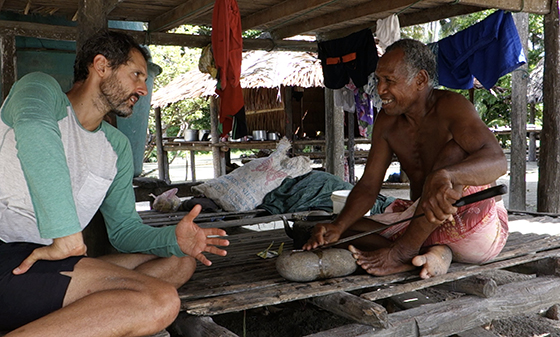
Carlos Crivelli converses with his friend Philipe in Kapisila village on the Trobriand Islands
Facial expressions open a doorway for human interaction yet their functions can be complex. It is why the task of unravelling them has taken Carlos from the university campus to remote parts of the planet, and why his research has been featured in internationally renowned academic journals, newspapers and magazines.
A career delving into people’s behaviours and their communication patterns, however, was not always an obvious one.
Carlos was born in Madrid and grew up in a comfortable neighbourhood enjoying an outdoor, sporty lifestyle, and consistently getting top grades at the same school from age three to 18, the private, non-religious Colegio Joyfe.
“It was not a dangerous thing, for us to play in our streets,” recalled Carlos, “so I grew up with plenty of friends.
“I love skateboarding because when I was about 11, it was the craze.
“I’m not doing tricks on my skateboard any more because I don’t want to twist an ankle or anything, but it’s what I use to scoot in to work when it doesn’t rain. I love it.”
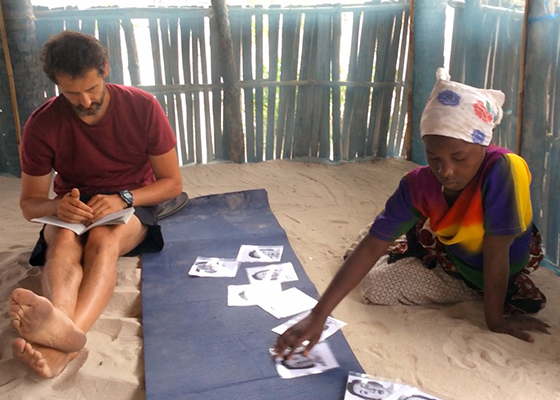
Researching a Mwani girl's responses to a test in Mozambique
He also loved playing basketball, the south American football variant futsal, and padel tennis (played on smaller courts with glass walls and solid padel rackets).
“I had a fine, fine, childhood,” he added. “I enjoyed my years at school and am still in contact with them; I returned to do some of my PhD studies with the students there.”
He got a degree from one of the best law schools, the Universidad Autónoma de Madrid, but it wasn’t easy.
“It was a reality check and I didn’t enjoy law so much,” he admitted, “but I had a group of friends and there was a moment when we thought ‘what are we doing here?’ Rather than quitting, we decided to work really hard to get it finished as quickly as we could.”
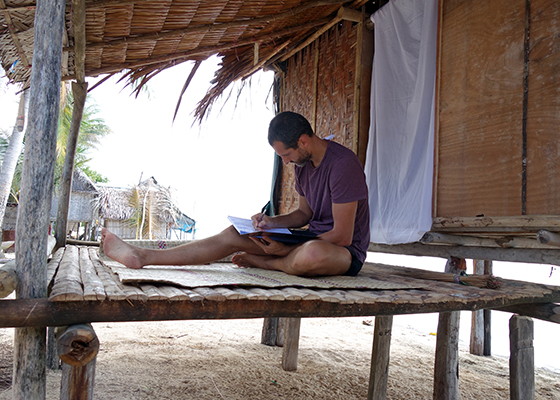
Carlos writes up research notes on the veranda of his hut in Papua New Guinea
He headed then to Italy to study modern languages, art and culture at the University of Urbino, in the Apennine Mountains, but interrupted that course after getting a job as cabin crew for Iberia Airlines, back in Madrid.
Suddenly, he was earning a good salary, staying in four- and five-star hotels across Europe, Africa, and the Middle East.
But somehow it was not intellectually challenging, and while continuing to work full-time as cabin crew, he embarked on a remarkable double life, managing his work shifts and holidays to sandwich in a return to the Universidad Autónoma de Madrid to study psychology.
“I was working during the weekends and was happy to do the night flights and then go straight to lectures. I would study while in the hotels - it was quite stressful during the exam periods!”
And he was good at it. He gained top marks and full MSc and PhD scholarships, focusing on the methodology of the behavioural and health sciences.
“I loved it,” he said. “Over the years I realised I like research. When I was young I didn’t like maths, but later I began to enjoy some of it and found it key for research.”
With a natural penchant for people-watching, and inspired by one of his professors, his mentor José-Miguel Fernández-Dols, Carlos’ research focus became the study of emotions and facial behaviour.
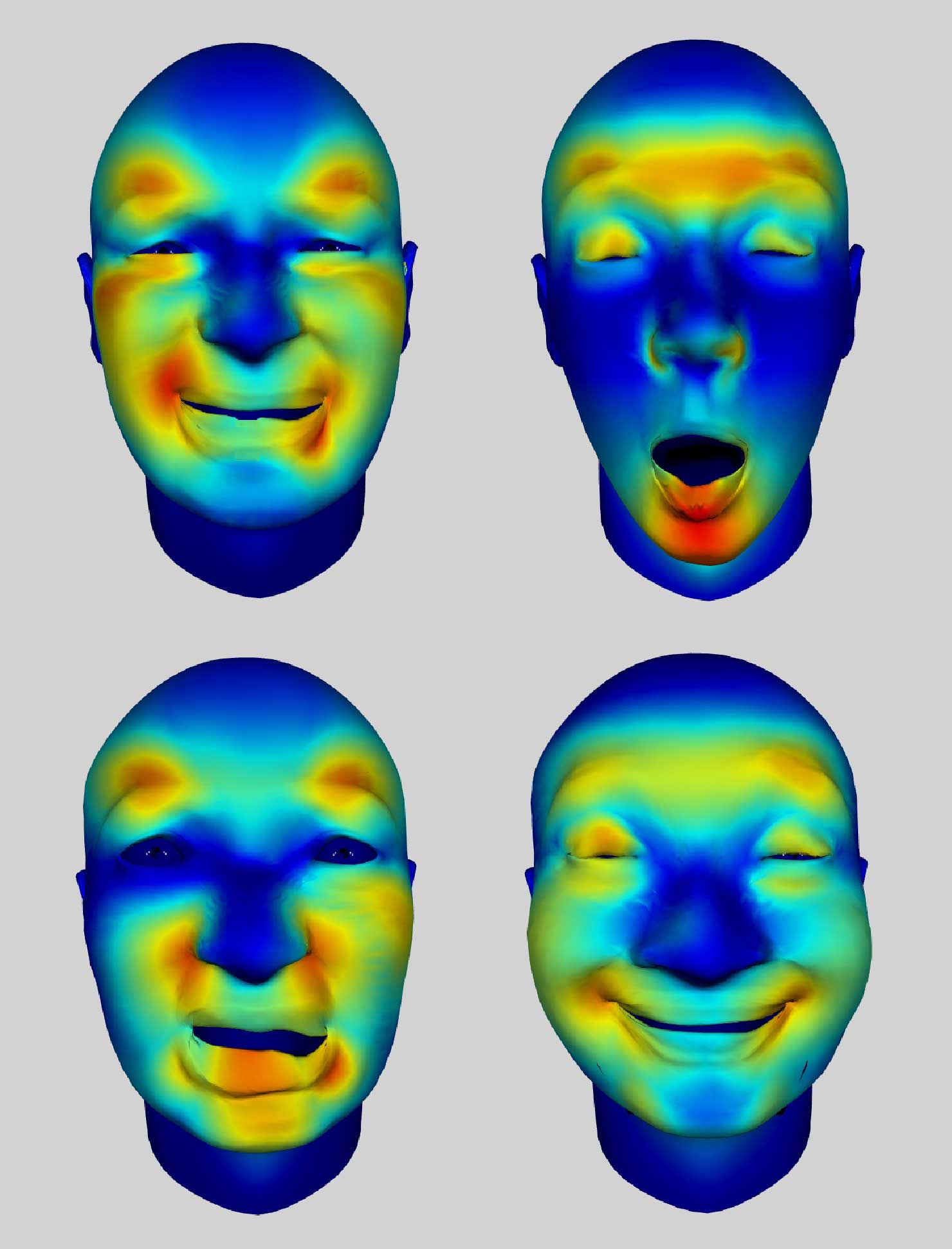
Research results - colour-coded face maps showing core facial expression patterns
Along with his mentor, they questioned the methodology used since the 1960s for research that had established ground-truth theories about emotions and facial behaviour – that, for example, Westerners tend to attribute happiness to smiling, anger to frowning, and fear to people displaying a gasping face. The problem was this was regarded as a universal truth.
“I had a moment of lucidity (or maybe madness). One of the key controversies of my field of research pivoted on the assumption that these Western theories of emotion and facial behaviour described and explained all human beings’ behaviours and modes of thinking. But, what about testing these ‘Western ground truths’ in small-scale societies with a high degree of isolation from Western culture?” recalled Carlos.
The feasibility of doing this challenging project depended on him linking up with an expert anthropologist, which he was able to do with his old friend from law school days, Dr Sergio Jarillo, who while at the University of Cambridge, had completed two years of fieldwork in the Trobriand Islands, a remote archipelago of Papua New Guinea.
In 2013, Carlos embarked on a three-month expedition to join Sergio to study the meaning of facial expressions to the Trobrianders—a Melanesian group of subsistence horticulturalists and fishermen.
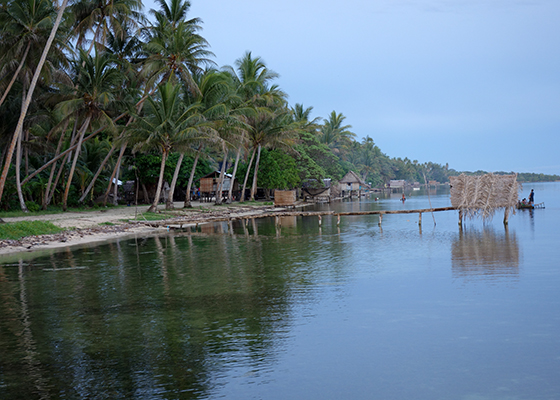
Kapisila village where Carlos lived on Kaileuna Island, one of Papua New Guinea's Trobriand Islands
The journey there was long and arduous, involving rough sea crossings and potential threat from pirates. Once there, Carlos lived in a simple hut without a bed, hardly able to go outdoors for the first weeks due to the ferocious wet season, and exposed to all sorts of tropical endemic diseases, including malaria, infected sores and viral conjunctivitis.
But the research paid off. Carlos gathered data meticulously, using rigorous methodologies and, with Sergio’s help, was the first psychologist to learn the local language and customs before doing any experimental tests. This allowed him to ensure the internal validity of his tests, in contrast to previous researchers who had relied on translators, ignoring local customs and imposing Western frames of reference.
This added to the impact of his findings, which challenged the established Western beliefs that there is an innate and universal set of facial expressions that we all produce and recognise in others when a particular basic emotion is felt.
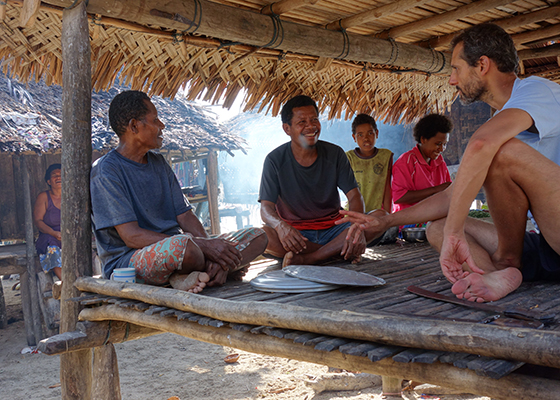
Chatting with Bulakwa villagers on the Trobriand Islands
He found many surprises, for example that an expression of the gasping face that Westerners would take as displaying fear and submission, is interpreted by the Trobrianders as a threatening face displayed by aggressors.
“It was not just my findings but how I conducted my research that had important implications. My research was challenging and opened up the possibilities of reframing the fundamentals of the study of facial behaviour, evidencing the ethnocentric lens used to date,” explained Carlos.
The impact of his early work secured research grants to expand his studies on facial behaviour and emotions to a second part of the world, to triangulate the Trobriand data to a second small-scale society of subsistence horticulturalists and fishermen: the Mwani of Mozambique’s Quirimbas archipelago, in south-east Africa.
He linked up with Sergio again in 2014 for a two-month expedition to study the Mwani, an isolated community of Sunni Sufi Muslims with limited Western contact, no electricity, no running water, no sewers – and again he lived in a beach hut, sleeping on a sand floor.
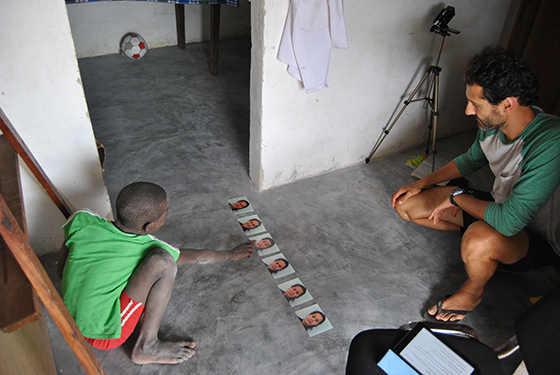
A Mwani boy in Misaula, Mozambique, points out a meaningful expression
More intense data-gathering expeditions to both destinations followed in subsequent years.
“What I found was very controversial, challenging to the establishment, not just in academia but in applications of basic theory such as educational training, clinical interventions, or lie-detection programmes used in national security, so affecting worldwide multi-million pound industries.
“Mine is probably one of the most important strands of research in this field in the last 30 years. I went to different small-scale societies and I got very consistent research that is forcing many to reconsider their theoretical positions and to question the robustness of the scientific evidence supporting very popular applications in emerging fields such as Artificial Intelligence and machine learning.”
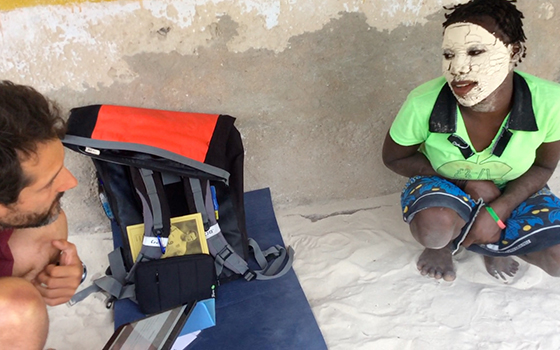
A girl's responses are noted on Matemo Island in Cabo Delgado Province, Mozambique
Sandwiched between these periods of intensive fieldwork, Carlos spent two terms as a visiting scholar at Boston College in the USA with Professor James Russell, working on a cross-cultural project, and at the University of Glasgow with Professors Philippe Schyns and Rachael Jack.
The latter collaboration led to a 2018 paper published in the USA’s Proceedings of the National Academy of Sciences (PNAS), using computer-generated models of facial expressions of pain and orgasm in West European and East Asian participants. The research showed that people’s facial expressions for experiences such as pain and orgasm could be different across different cultures. This project was linked to Carlos’ previous observational research on the facial behaviours of more than 100 people who had filmed their faces (no nudity) while masturbating to orgasm and then had uploaded their videos to a pre-existing website.
Carlos’ various research papers have been reported on by significant academic journals as well as media such as Science magazine, The Boston Globe, El País, Repubblica, Der Spiegel, Cosmopolitan, the BBC and Newsweek.
The skateboarding academic may be settled in Leicester since getting his research lecturer job at DMU in April 2017 – but he’ll be packing his bags again soon to answer the call of more fieldwork projects in Mozambique and the Pacific.
Posted on Tuesday 11 June 2019